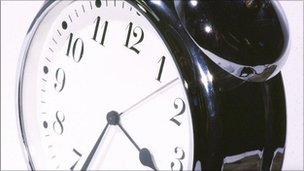End of GMT 'would boost economy' says Boris Johnson
- Published

A psychologist has warned abandoning GMT may have drawbacks
London's economy could be boosted by more than half a billion pounds if the clocks were not turned back, a report from the mayor of London has claimed.
British Summer Time is due to end this weekend.
The study said tourism could be boosted by between £240m and £720m with attractions able to stay open later.
Mayor Boris Johnson said: "It's barmy that a great trading city like London is so out of kilter with the rest of Europe."
The report said abandoning the change between BST and GMT would provide 40% more business time overlap with the continent and enable Londoners to attend morning meetings in Europe without staying overnight.
And the study claimed financiers would have more time in the morning to trade with Asian markets.
'More play'
Mr Johnson continued: "We do immense amounts of trade across the channel and all the evidence shows we have little to lose and much to gain by setting our clocks in line with Paris, Frankfurt and other big cities.
"It will also greatly improve the quality of life for Londoners, wasting less daylight while they are sleeping and giving them more options for leisure and play when the working day is over."
Dr David Lewis, a chartered psychologist who has done research into the effect of sunshine on people's well-being, said he thought there were arguments for both sides.
He said: "If people can be persuaded to get out more and exercise after school and work, they are more likely to do it if it's light, than if it's dark.
"But there is a danger that people leaving for work in the morning don't really wake up properly if it's not light."
- Published29 October 2010